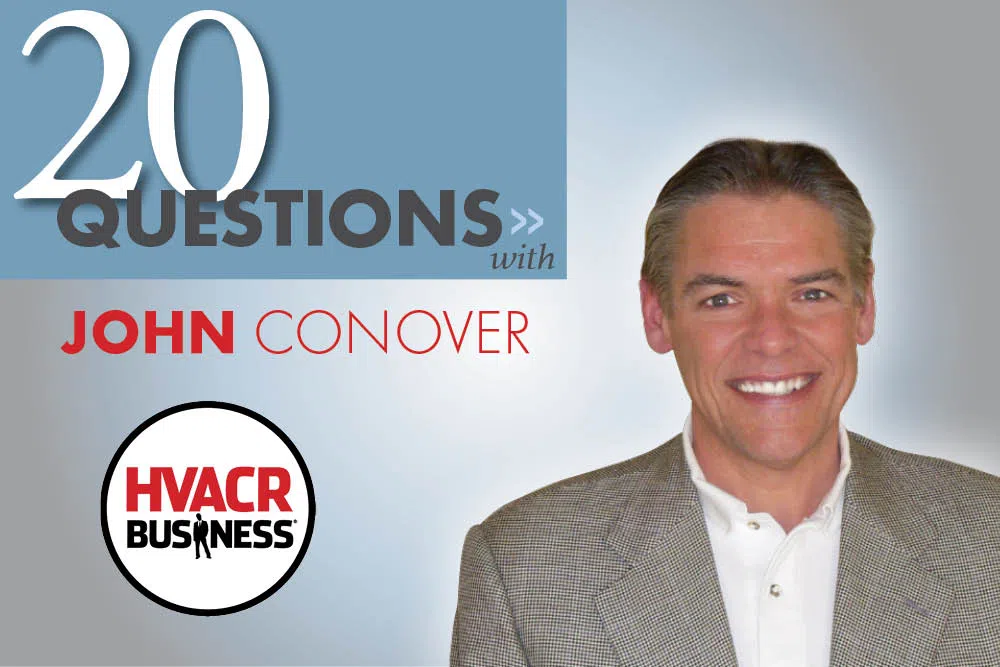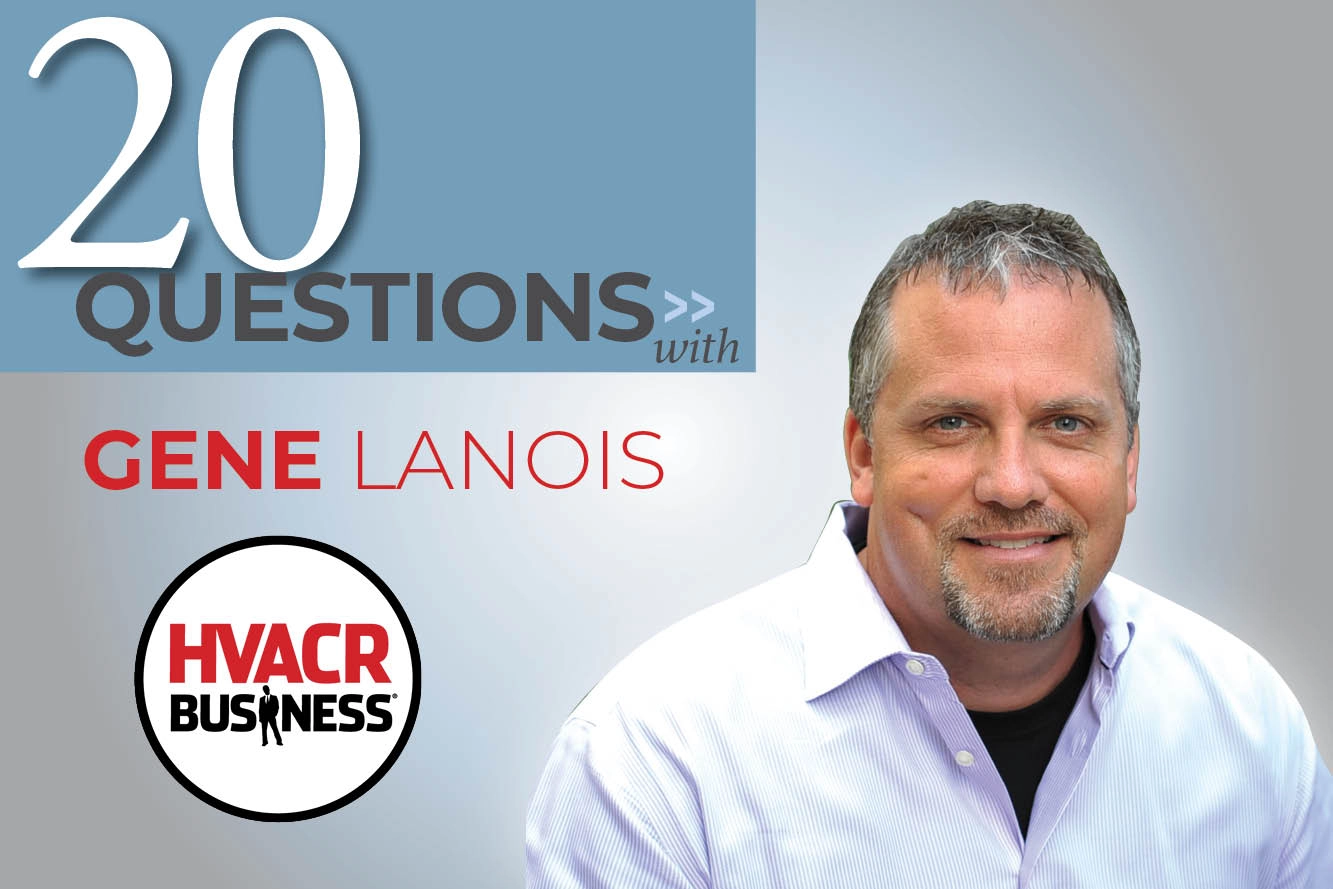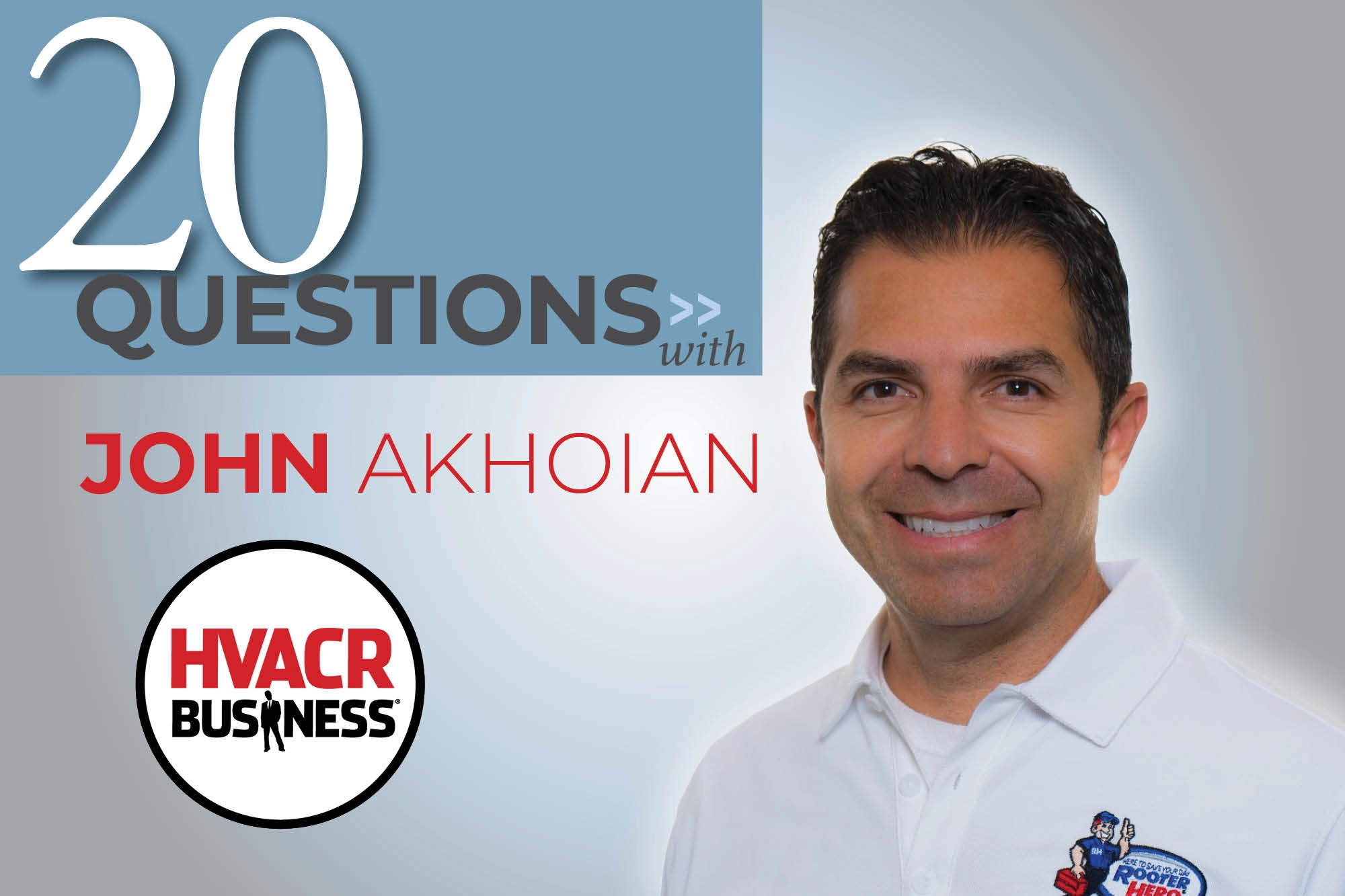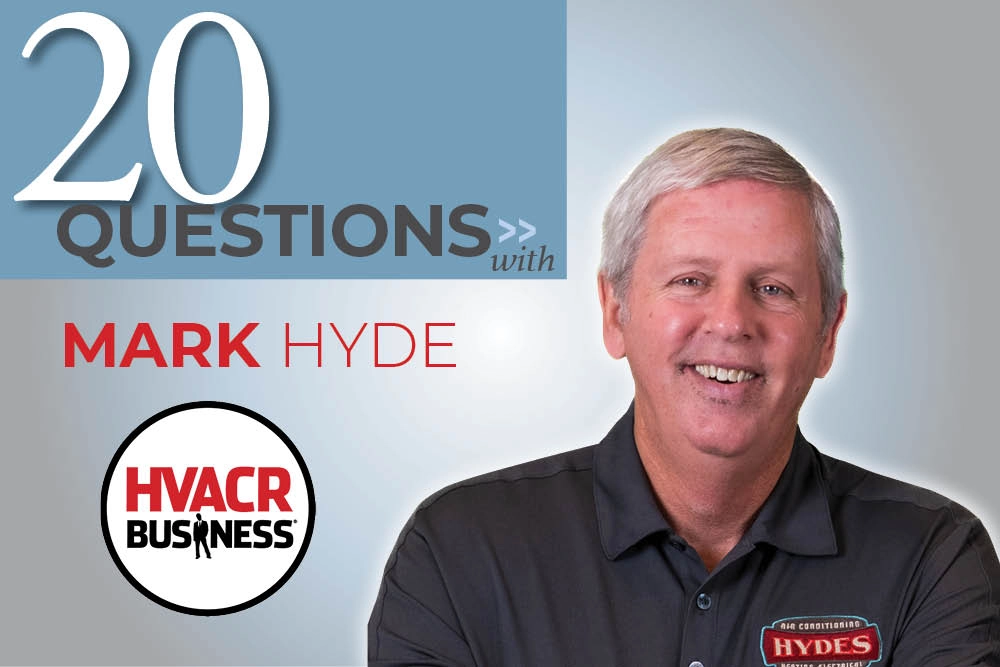John Conover, President, Trane Commercial Systems, met with HVACR Business Publisher Terry Tanker at the Mechanical Contractors Association of America (MCAA) Annual Convention in Palm Desert, Calif. They discussed the industry, sports and sage advice.
1. What is your favorite movie of all time?
The Matrix. My boys and I went to the midnight viewing opening night. I've seen it probably more times than I can remember. I've always been a bit of a science fiction fan. I like the human element of it. I like the intellectual thought-provoking elements of it. Being an engineer, I guess I've always liked technology, but most importantly I've always liked looking forward as opposed to backwards. You think about business, life, movies and literature — science fiction is the only form of literature that looks forward. It gives you a lot of time to think about where we're going and what we can do to influence it and the actions today and implications tomorrow.
2. What is the best present you've ever given to someone?
I think the best present I've ever given is the same thing I've given for 15 years — a family ski trip at Christmas. My wife and I, with our four children, go away every year at Christmas on a ski vacation. It's a great time even though I am the worst skier in the family. It's always been a special time for us. And even though my children are older now, they still find a way to make that trip every year. We've been all over — out West, Switzerland, and Europe. My daughter and the three boys are all snowboarders. My oldest son is a very good snowboarder — he was the captain of the University of Virginia Ski & Snowboard team and competed in the NCAA Nationals. I attempted snowboarding once and have never attempted it again. The day after I woke up and I was black and blue as I'd ever been.
3. You played football at Lehigh University. What was your position?
I did not play football at Lehigh. I went away to college, pre-dental, and played in Lebanon Valley College. One day I had a blinding flash of the obvious that I didn't want to be a dentist, so I to transferred to Lehigh and gave up my football and wrestling careers. Wrestling was my first sport and football was my second sport — I played offensive center. I wrestled anywhere from 157 [pounds] to heavy weight depending on what the coach needed. While playing football I was 195 pounds. My average wrestling weight was 168 pounds, so I had to drop 30 pounds pretty quickly to get back to wrestling season — it was an interesting athletic career.
4. Why do you think so many business leaders played organized team sports?
In football, particularly being an offensive lineman, you're really part of the team and an offensive line has to move together, think together, act together and to be part of that team. Also, being an offensive center is interesting because you're, to a certain extent, the leader of the offensive line and you're the follower of the quarterback. We talk about leadership a lot and I think that one of the things we don't talk about a whole lot in business today is greatfollowership. All of us at one point or another were leaders. Sometimes we have to be a follower and the world's made up of a lot of great followers that make business successful. I think playing football gives you both perspectives. Conversely, in wrestling and boxing you're out there all alone. You have to learn to stand on your own. If you're playing a team sport and you lose, there are a lot of variables. When you're wrestling and you lose, everybody in that gymnasium knows you got your butt kicked. I look back and I say that for me both had a big influence on my life at the time.
5. When you find yourself losing focus what brings you back on track?
In the short term: working out and getting a good night's sleep. In the longer term it's customers. The people at headquarters know that when I get lost in all the details I'll say I'm going out in the field. I'm going to go visit some customers because I think that's really who hires and fires us every day. They are the people that we really need to focus on in running our business. If I lose focus, I go out and visit customers — they'll help me focus. I've always enjoyed customers even in difficult times. When there's a difficult issue on the floor I enjoy being with the customer and working through issues.
6. You travel extensively. What are your favorite airline, hotel and restaurant in the U.S.?
You know your flying too much when Continental Airlines invites you to the Superbowl. My favorite airline in the U.S. is Continental Airlines, my favorite hotel is The Drake Hotel in Chicago, and my favorite restaurant is Oyster Creek Inn, Leeds Point, N.J. I've been going there since I was a kid, and the poem on the back of the menu was written by my grandfather.
7. What tools do you use to stay organized?
Donna Gibbons, my executive assistant, is fabulous at keeping me organized. I rely on her far more than I rely on any technology.
8. If you could rewind the clock and hit the redo button, what would you like another shot at?
Learning to ski and play golf at a much younger age. I started when I was 30 years old.
9. You started with Trane as a sales engineer. What was the most gratifying sale you made?
I'll classify that as the most satisfying relationship. It was with Ben Thied the facility director at Eastern Michigan University in Ypsilanti. I called on Ben and he said he had a lot of challenges and was looking for a partner to work with on those challenges. It wasn't a fancy job, but it was more about the relationship and everybody sitting down and working together and trying to understand what the University needs were and how we could do it within a budget and do it within the technical capabilities of the people they have on staff.
10. What is the most significant challenge facing Trane's Commercial business this year?
Finding, acquiring and retaining top talent. To a certain extent it's becoming a diminishing pool for a growing need.
11. What ideas have you come up with to address the challenge?
There isn't a single fix but rather a series of smaller steps woven together help us — whether it's finding new ways to encourage kids to study engineering or giving existing college and technical school students the right incentive.
Specifically, we're working with the Girl Scouts of America on a new Environmental Merit Badge and I think that's a great idea because women are clearly one of the talent pools that this industry hasn't tapped. We've been involved as an industry for many years with the Boy Scouts and all the sudden, somebody suggests the Girl Scouts and you think, why not?
Trane's fairly aggressive in college recruiting. A lot of us on the leadership team now are involved with visiting college campuses.
We have six target schools that are our top recruiting focus. Iowa State, Purdue, Cal Poly, Georgia Tech, Penn State, Texas A&M.
We have a graduate training program for college graduates. They're in a class room environment in Lacrosse, Wisc., for six months. And at the end of that they have field training for six months. A lot of people think that is exorbitant in today's world, but I think that it's one of the key differentiators of Trane. Not only do we offer all this training but that we have the best trained people in the industry
12. How would you complete this sentence? My father always said…
Show no fear. It's something he always said and it's something I'll never forget. I remember we were watching a Tarzan movie and Jane and Tarzan were surrounded by gorillas. Tarzan turned to her and said, "Show no fear."
My father was a big believer in that and always said, "Kid, there's going to be tough times in life, there'll be bad things that happen. To those around you look calm and show no fear."
13. Most business leaders have had good mentors. Who was yours and what was his/her best advice?
I've been fortunate to have a lot of good mentors throughout my career. One who stands out is a district manager in Detroit, Moe Bouchard. He advised me when I left Detroit to go to Columbus, and he also advised me when I left Columbus to take this role. He also taught me not to be afraid to fail. You have to continue developing yourself, you have to continue to take on new challenges if you're going to continue to grow and develop yourself. That's how we develop as a person and that's how we develop as a leader.
14. What do commercial contractors need to become better at?
I think it's teaming and working the value chain up and down. That we work together in team-build situations — owners, engineers, contractors, and manufacturers — as opposed to working in more of a bid-and-buy, low-cost mentality. Our Strategic Partners Program, which has some of our best contractors, is where we brainstorm and work together on how we can make the industry better.
15. What should contractors be doing to be more effective marketers of IAQ products and services?
Understand the issues, understand the technology, understand that IAQ requirements are different for every customer — a fast food restaurant versus a K-12 school are dealing with different issues around indoor air quality and understanding the technologies. We have application engineering teams and technology engineering teams that are focused on these issues and then we designate the local office, depending on the size, LEED experts. We have 100 LEED AP certified people in the field. That's the value we can bring to the contractors
16. What trends in the market do you see?
The Green movement and the environmental movement. But an important subset of that is energy. Energy is a big issue. This industry is going to have the opportunity within the next five to 10 years to play a significant role in the environmental and green movement on a global basis. You can say 40% of the energy is consumed by buildings. If you look at the construction phase it's maybe closer to 50%. If we're going to really address this energy issue, it's going to take buildings and it's going to take our industry.
17. What new programs is Trane introducing to take advantage of the existing building market?
We're launching a lot of programs. Right now we have a rooftop retro-fit program and we've had great success in the large unitary rooftop business. The other big technology we've been working on for existing buildings and retro-fits is wireless technology — wireless zone sensors and wireless control systems that allow a lot of renovation and retro-fit. The other project that comes to mind is the chiller-source rental business, which is designed to support mission-critical existing buildings with the rental-chiller program.
18. Are rising energy costs an opportunity for Trane?
The opportunity for us and the industry is great. If for no other reason, our industry is going to be looked to for answers much sooner in the project's life. We have products, we have control systems, and we have new systems. That's one of the big changes at Trane. We're trying to look not at pieces of equipment, but synergistically how can we make an entire system? The big opportunities now are how we put pieces of the system together and get big gains in the entire system, not just by looking at individual pieces.
19. You authored an article "Mechanical Contractors Can Get More Green Out of Green Projects." How important is it that contractors buy into the green movement and learn to sell it?
I think that it's going to be very important if you want to be a leading-edge contractor and you want to differentiate yourself in the market place. Being involved in that teaming concept on building new projects is essential. It's essential not only from a standpoint of selling it, but also understanding how to build it. And if you want to be competitive in the market place you're going to have to understand that.
20. It looks like House Bill H.R. 345, which reduces the depreciation schedule of hvac equipment, may not make it into law once again. If this ever does pass legislation, what kind of impact will it have for equipment manufactures?
We are a supporter of it. We think that it's another piece of the puzzle. By lowering the depreciation life of this equipment, it'll help fit the payback in the financial solutions in going green. At the end of the day, the environmental movement will not make a lot of progress if it's just about doing the right thing; it's got to make business sense as well. And this will help the formula as far as we look at paybacks and life-cycle cost analysis in retrofits. All the manufacturers, the products we're putting out there today are 40% more efficient than what we were building just 20 years ago. The big opportunity if we want to attack this energy issue is to go back and tackle those old buildings.






